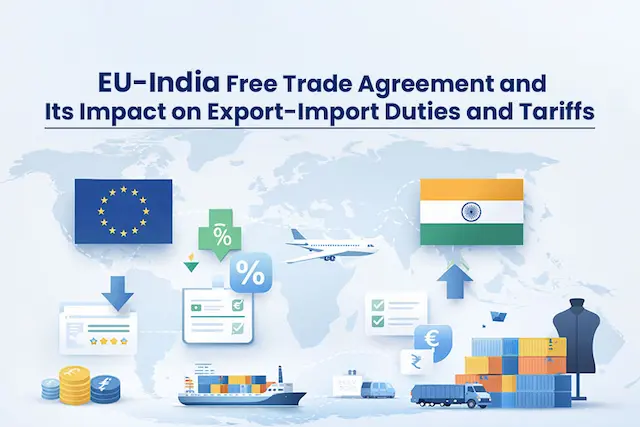Like every business, even exporters are majorly dependent on capital to run and maintain their production along with everyday operations. However, exporters can have hindrances in sustaining their business operations due to lack of capital. Here, export finance in India can come up as a savior in terms of funds.
What is Export Finance in India
Export finance refers to financial products and services available to companies that export goods or services. These can include export credit insurance, export loans, and trade finance services like letters of credit. The goal is to help companies manage export risks and costs while providing funding for their growth.
Types of Export Finance in India
Basically, there are 5 types of export Finance in India:
1. Pre-Shipment Export Finance
Pre-Shipment Export Finance is the type of finance where the funds are provided to the exporter before the shipment of goods. These funds are basically provided to buy raw materials, process the raw materials into the final products, package them, etc. There are two best sources of this type of export finance:
Packing Credit: You can obtain Pre-Shipment Export Finance from your financier by using a Packing Credit, which is based on an export order you will receive from the importer. When the overseas buyer releases your funds, the Packing Credit amount will be adjusted, and the loan will be closed against that specific order.
Business Loan: You can simply opt for a business loan to buy raw materials and go on with the manufacturing.
2. Post-Shipment Export Finance
Once you have sent the products and issued an invoice to the importer, you need to wait for payment. During this credit period, you may require working capital to handle other orders. To address this, you can utilize post-shipment finance from the following sources:
Bill Discounting and Invoice Factoring: You can get the funds from your financial institution by simply presenting your invoice to them. The banker has options of purchasing, collecting, or discounting the bills.
3. Export Finance Against The Collection of Bills
Banks typically offer financing for export bills, which are repaid by guaranteeing companies in case of non-payment. These lenders provide financial assistance of approximately 90% of the FOB (freight-on-board) value of the export.
4. Deferred Export Finance
To facilitate the purchase of valuable goods by the importer, options such as hire purchase financing or lease finance can be arranged. Additionally, there are two types of deferred export finance available.
Supplier’s Credit & Buyer’s Credit: There are two different types of financing options available: supplier’s credit and buyer’s credit. With supplier’s credit, the exporter’s bank provides the exporter with the full invoice amount, allowing the importer to make installment payments to the exporter’s bank. On the other hand, with buyer’s credit, the importer is granted credit under a line of credit by their own bank, making the export transaction smoother.
5. Export Finance Against Allowances and Subsidies
To promote international trade, the government offers subsidies to exporters. These grants aim to address various aspects such as mitigating increased transport costs through cash compensatory measures and facilitating export flow through labor wage and duty drawbacks. It is important for businesses engaged in international trade to choose an appropriate export financing option based on their specific needs and long-term export strategy.
How Does Export Financing Work?
Export financing works in the similar manner like invoice factoring, where exporters can get capital based on the value of their outstanding invoices. This type of funding relies on treating the invoices held by a foreign debtor as collateral to secure a cash advance.
The process of export financing goes like this:
An exporter sells goods to a customer or importer.
The exporter issues an invoice to the importer, allowing them to pay for the goods upon receipt, and subsequently ships the goods.
To maintain a steady cash flow, the exporter sells the invoice to a financial institution, receiving a significant portion of the invoice value upfront.
The responsibility of collecting payment from the customer on the due date is assumed by the financial institution.
After the payment is successfully collected, the remaining amount of the invoice is transferred to the exporter, minus a nominal fee deducted by the financial institution.
Benefits of Export Finance In India
Export finance plays a crucial role in supporting and promoting international trade in India. Here are some benefits of export finance:
Working Capital Support: Export finance provides working capital to businesses engaged in exporting goods and services. It helps them fulfill orders, manage cash flow, and cover various expenses related to production, packaging, transportation, and marketing.
Risk Mitigation: Export finance instruments such as letters of credit and export credit insurance help mitigate the risks associated with international trade. Letters of credit provide assurance to exporters that they will receive payment upon meeting the specified terms and conditions. Export credit insurance protects exporters against non-payment or delayed payment by buyers, political risks, or commercial risks.
Access to New Markets: Export finance facilitates entry into new markets by providing financial resources to businesses. It enables companies to explore international opportunities, expand their customer base, and diversify their revenue streams. The availability of export finance can encourage businesses to venture into unfamiliar markets and explore untapped potential.
Competitive Advantage: Export finance can give Indian exporters a competitive advantage by offering favorable terms and conditions to overseas buyers. For example, exporters can offer flexible payment options, such as trade credit or deferred payment terms, which can attract buyers and increase their sales. Export finance also enables businesses to offer competitive pricing and negotiate better terms with suppliers and service providers.
Infrastructure Development: Export finance can contribute to the development of export-oriented infrastructure in India. Financial institutions and government agencies provide support for building ports, logistics facilities, warehouses, and transportation networks, which enhances the efficiency of the export supply chain and reduces transaction costs.
Export Promotion: Export finance programs often include export promotion initiatives and schemes. These programs provide financial incentives, grants, subsidies, or reduced interest rates to encourage businesses to export their products and services. They may also offer support for market research, product development, branding, and participation in trade fairs and exhibitions.
Economic Growth and Job Creation: Export finance plays a vital role in driving economic growth and job creation in India. By supporting exporters and expanding international trade, it stimulates economic activity, generates foreign exchange earnings, and creates employment opportunities across various sectors, including manufacturing, agriculture, services, and technology.
Risk Diversification: Export finance allows businesses to diversify their risks by expanding their customer base beyond domestic markets. This reduces their dependence on the domestic economy and helps them mitigate the impact of economic fluctuations or downturns in a particular region or country.
Overall, export finance in India provides a range of benefits that facilitate international trade, boost economic growth, and enhance the competitiveness of Indian businesses in the global market.
Importance of Export Finance in India
Export finance plays a crucial role in the economic growth and development of India. It provides the necessary financial support and resources to exporters, enabling them to expand their businesses, explore new markets, and compete globally. Here are some key reasons why export finance is important in India:
Facilitates International Trade: Export finance helps facilitate international trade by providing funds to exporters. It allows Indian businesses to fulfill export orders, meet production demands, and deliver goods and services to overseas markets. By ensuring a steady flow of funds, export finance minimizes the financial barriers associated with cross-border transactions and enables exporters to seize global business opportunities.
Boosts Export Competitiveness: Export finance plays a crucial role in enhancing the competitiveness of Indian exporters. It enables them to offer competitive pricing, favorable payment terms, and credit facilities to overseas buyers. Exporters can utilize export finance tools such as export credit insurance, export factoring, and export letters of credit to mitigate risks and offer attractive financing options to their international customers. This, in turn, helps Indian exporters gain a competitive edge in the global market.
Supports Working Capital Requirements: Exporting goods and services often involves a time gap between production and receipt of payment. Export finance addresses this issue by providing working capital to exporters. It helps bridge the gap between the time when exporters incur expenses for production and the time they receive payment from overseas buyers. This ensures smooth operations, sustained cash flow, and efficient management of business operations.
Mitigates Export Risks: Export finance instruments such as export credit insurance provide protection against risks associated with international trade, including non-payment by overseas buyers, political instability, currency fluctuations, and trade disruptions. By mitigating these risks, export finance instills confidence in exporters, encourages them to explore new markets, and promotes long-term sustainability in international trade.
Promotes Economic Growth and Employment: Export finance contributes to economic growth and employment generation in India. By supporting exporters and enabling them to expand their businesses, it leads to increased production, job creation, and income generation. Export-oriented industries such as manufacturing, textiles, IT services, and agriculture benefit from export finance, fostering economic development and contributing to the country’s GDP.
Enhances Foreign Exchange Reserves: Export finance plays a vital role in earning foreign exchange for India. By facilitating exports and ensuring timely payment, it helps accumulate foreign currency reserves. These reserves are crucial for maintaining currency stability, financing imports, meeting international obligations, and managing economic uncertainties.
In summary, export finance is of significant importance to India as it facilitates international trade, boosts export competitiveness, supports working capital requirements, mitigates export risks, promotes economic growth and employment, and enhances foreign exchange reserves. It is a crucial enabler for Indian exporters, allowing them to thrive in the global marketplace and contribute to the country’s overall economic development.
What Are the Institutions Involved in Export Finance in India?
Not only are there institutions that provide export finance, but even the institutions that already exist have opened multiple avenues to provide export finance. Here are some of the institutions:
Export Import bank
Commercial banks, both nationalized and non-nationalized
Development banks such as IDBI, ICICI, etc.
Small Industries Development Bank of India
State Finance Corporations
National Small Industries Corporation
Export Credit Guarantee Corporation
To Conclude
In conclusion, export finance plays a vital role in supporting and promoting international trade in India. It provides essential financial resources, risk mitigation tools, and market opportunities to exporters, enabling them to expand their businesses, explore new markets, and compete globally. The availability of various types of export finance, such as pre-shipment and post-shipment finance, export credit insurance, and export finance against allowances and subsidies, caters to the diverse needs of exporters.
The institutions involved in export finance, including the Export-Import Bank, commercial banks, development banks, and specialized financial corporations, contribute to the growth and success of Indian exporters in the global market. Overall, export finance in India fosters economic growth, job creation, and the development of export-oriented industries, while strengthening the country’s position in international trade.




